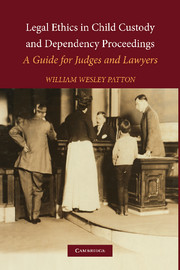Book contents
- Frontmatter
- Contents
- Foreword, by Martin Guggenheim
- Acknowledgments
- Introduction
- 1 Conflicts of Interest
- 2 Competent and Zealous Representation
- 3 Confidentiality
- 4 The Ethics of Alternative Dispute Resolution in Child Custody and Dependency Proceedings
- 5 Ethical Considerations and Constraints in Child Custody and Dependency Appeals
- 6 The Constitutionality of Legislative and Executive Regulation of the Practice of Law and Defining the Attorney-Client Relationship
- Appendix A National Association of Counsel for Children Standards
- Appendix B American Bar Association Standards of Practice for Lawyers Who Represent Children in Abuse and Neglect Cases
- Appendix C In re Car Simulation and Analysis
- Other Authorities
- Cases and Ethics Opinions
- Index
5 - Ethical Considerations and Constraints in Child Custody and Dependency Appeals
Published online by Cambridge University Press: 24 July 2009
- Frontmatter
- Contents
- Foreword, by Martin Guggenheim
- Acknowledgments
- Introduction
- 1 Conflicts of Interest
- 2 Competent and Zealous Representation
- 3 Confidentiality
- 4 The Ethics of Alternative Dispute Resolution in Child Custody and Dependency Proceedings
- 5 Ethical Considerations and Constraints in Child Custody and Dependency Appeals
- 6 The Constitutionality of Legislative and Executive Regulation of the Practice of Law and Defining the Attorney-Client Relationship
- Appendix A National Association of Counsel for Children Standards
- Appendix B American Bar Association Standards of Practice for Lawyers Who Represent Children in Abuse and Neglect Cases
- Appendix C In re Car Simulation and Analysis
- Other Authorities
- Cases and Ethics Opinions
- Index
Summary
Because many parties in both family custody and in child dependency cases do not have a constitutional or statutory right to appointed counsel on appeal, it should not be surprising that appellate courts have rarely discussed legal ethics in those proceedings. “Historically, family and juvenile courts have been largely pro se tribunals in which legal representation was permitted, but not encouraged.” And during the last decade of “limited appellate court resources and burgeoning caseloads,” some appellate jurists have bemoaned the “general deterioration in the quality of appellate advocacy.” State bar association mandatory continuing legal education courses rarely involve appellate advocacy training, and there are few avenues for attorneys, once they graduate from law school, to receive formal training in appellate skills and/or specialized training in the custody and dependency appellate processes. This chapter focuses on those few areas of concentrated ethical decisions in appeals involving child custody and juvenile dependency and attempts to answer some of the following questions: (1) Is there a right to appointed appellate counsel; (2) who has standing to appeal; (3) what is the subject matter jurisdiction of appellate courts in these proceedings; (4) should appellate courts apply a narrow or liberal construction to appellate rules of court; (5) under what circumstances are trial issues waived from consideration on appeal; and (6) what are appellate counsel's ethical duties.
- Type
- Chapter
- Information
- Legal Ethics in Child Custody and Dependency ProceedingsA Guide for Judges and Lawyers, pp. 120 - 144Publisher: Cambridge University PressPrint publication year: 2006

